✈️ About GL.iNet Travel Routers
GL.iNet Mini VPN routers are compact, powerful devices perfect for digital nomads, travelers, and remote workers. These pocket-sized routers provide secure VPN connections for all your devices, anywhere in the world.
Why Choose GL.iNet with TorGuard?
Hotel Wi-Fi Security
Protect all devices on untrusted hotel networks
Café & Public Wi-Fi
Secure connection in coffee shops and airports
Airbnb & Rentals
Create your own secure network anywhere
Gaming Consoles
VPN for devices that don't support VPN apps
Streaming Devices
Access content on Roku, Chromecast, Apple TV
Business Travel
Secure connection for work devices
GL.iNet Router Models
GL-AR750S-EXT (Slate)
- CPU: 775MHz QCA9563
- RAM: 128MB DDR2
- Storage: 16MB + MicroSD slot
- Wi-Fi: Dual-band AC750
- Ports: 3x Gigabit Ethernet
- Size: 100×68×24mm
- Best for: Power users, multiple devices
GL-MT300N-V2 (Mango)
- CPU: 580MHz MT7628NN
- RAM: 128MB DDR2
- Storage: 16MB
- Wi-Fi: 2.4GHz N300
- Ports: 2x 100Mbps Ethernet
- Size: 58×58×25mm
- Best for: Ultra-portable, budget
GL-AXT1800 (Slate AX)
- CPU: 1.2GHz Quad-core
- RAM: 512MB DDR3L
- Storage: 128MB
- Wi-Fi: Wi-Fi 6 AX1800
- Ports: 3x Gigabit Ethernet
- Size: 115×82×30mm
- Best for: High performance, Wi-Fi 6
Interface Version Comparison
🆕 New Interface (3.x)
- Modern UI design
- Drag & drop config upload
- Real-time connection stats
- Mobile-friendly interface
- Multiple VPN profiles
- This guide covers this version
📟 Old Interface (2.x)
- Legacy UI design
- Manual config upload
- Basic connection info
- Desktop-focused
- Single VPN profile
- See our legacy guide
Step-by-Step Configuration
Access Router Interface
Connect to your GL.iNet router via Wi-Fi or Ethernet, then open your browser and navigate to:
- Primary:
192.168.8.1 - Alternative:
192.168.18.1
Log in with your admin credentials (default is usually on the router's label).
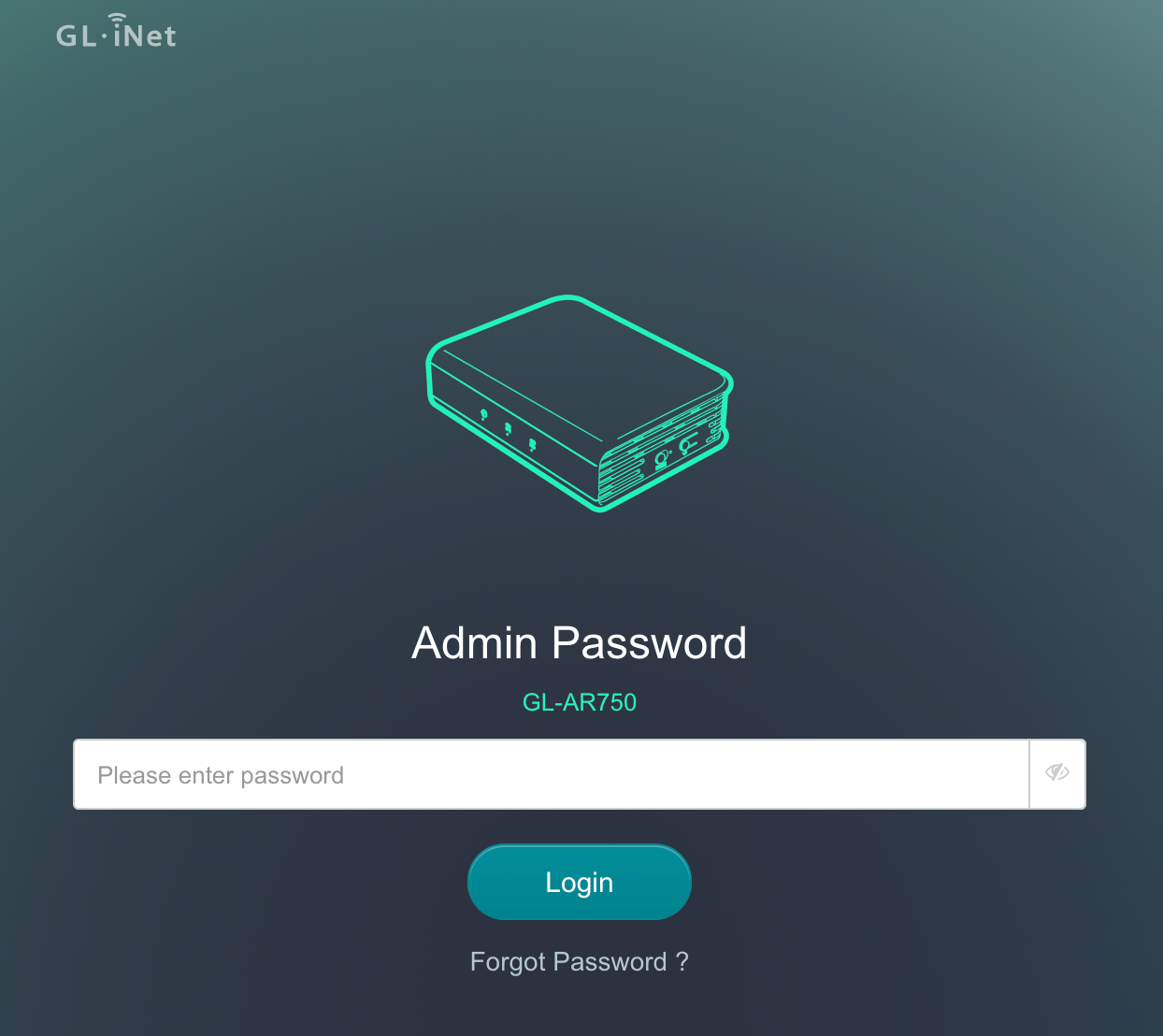
Navigate to VPN Section
Once logged in:
- Click VPN in the left menu
- Select OpenVPN Client from the sub-menu
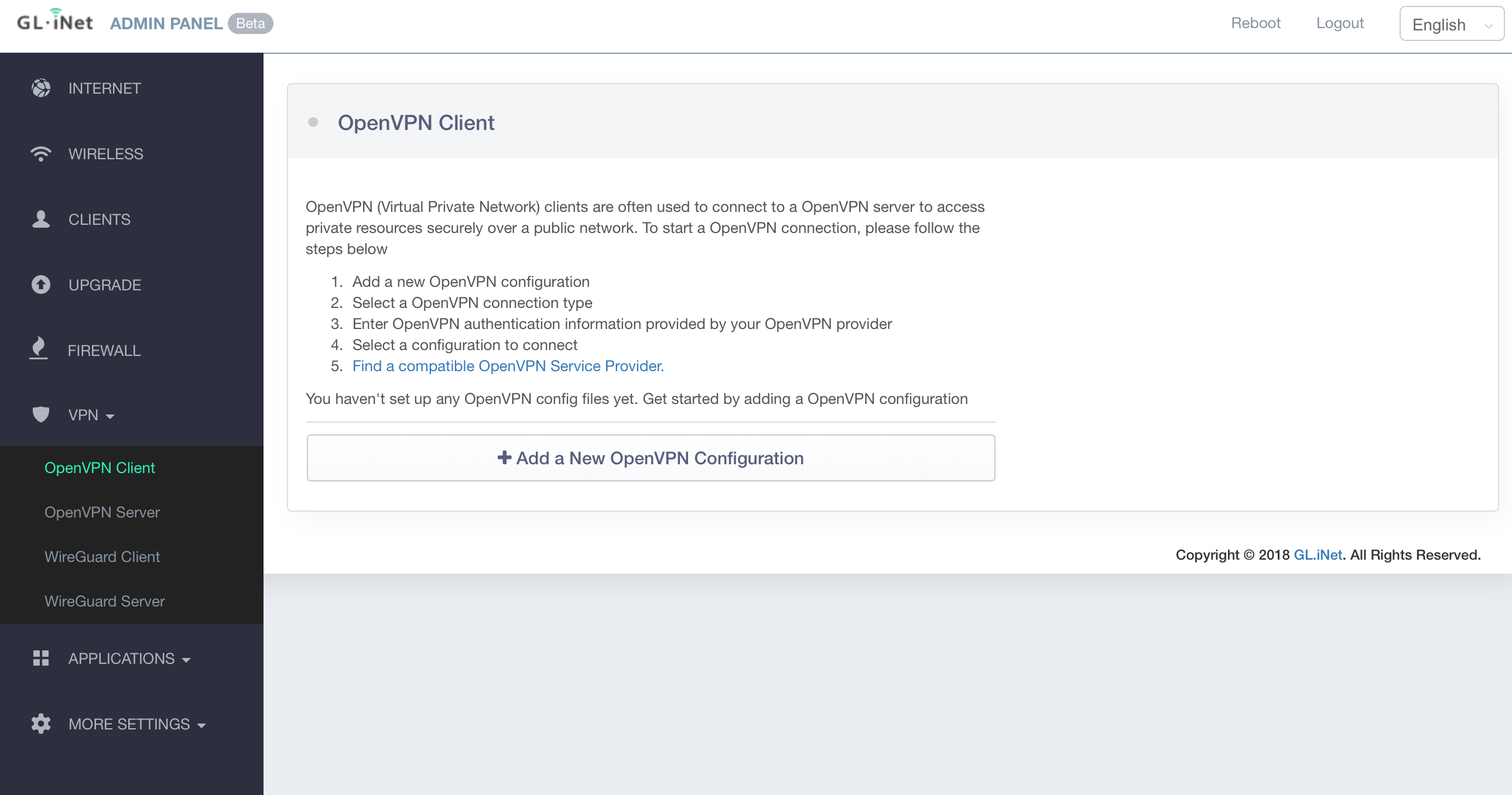
Generate TorGuard Config
Visit the TorGuard Config Generator:
Configuration Parameters
- Device Type:
- Select the GL.iNet icon (top row)
- Server Location:
- Choose your preferred country or enter a dedicated IP
- VPN Protocol:
- UDP (faster) or TCP (more reliable)
- VPN Port:
- 1912 (default) or choose from available ports
- VPN Cipher:
- AES-128-GCM (recommended for router performance)
- OpenVPN Version:
- OpenVPN 2.4 and above
- TLS 1.2:
- Optional but recommended for security
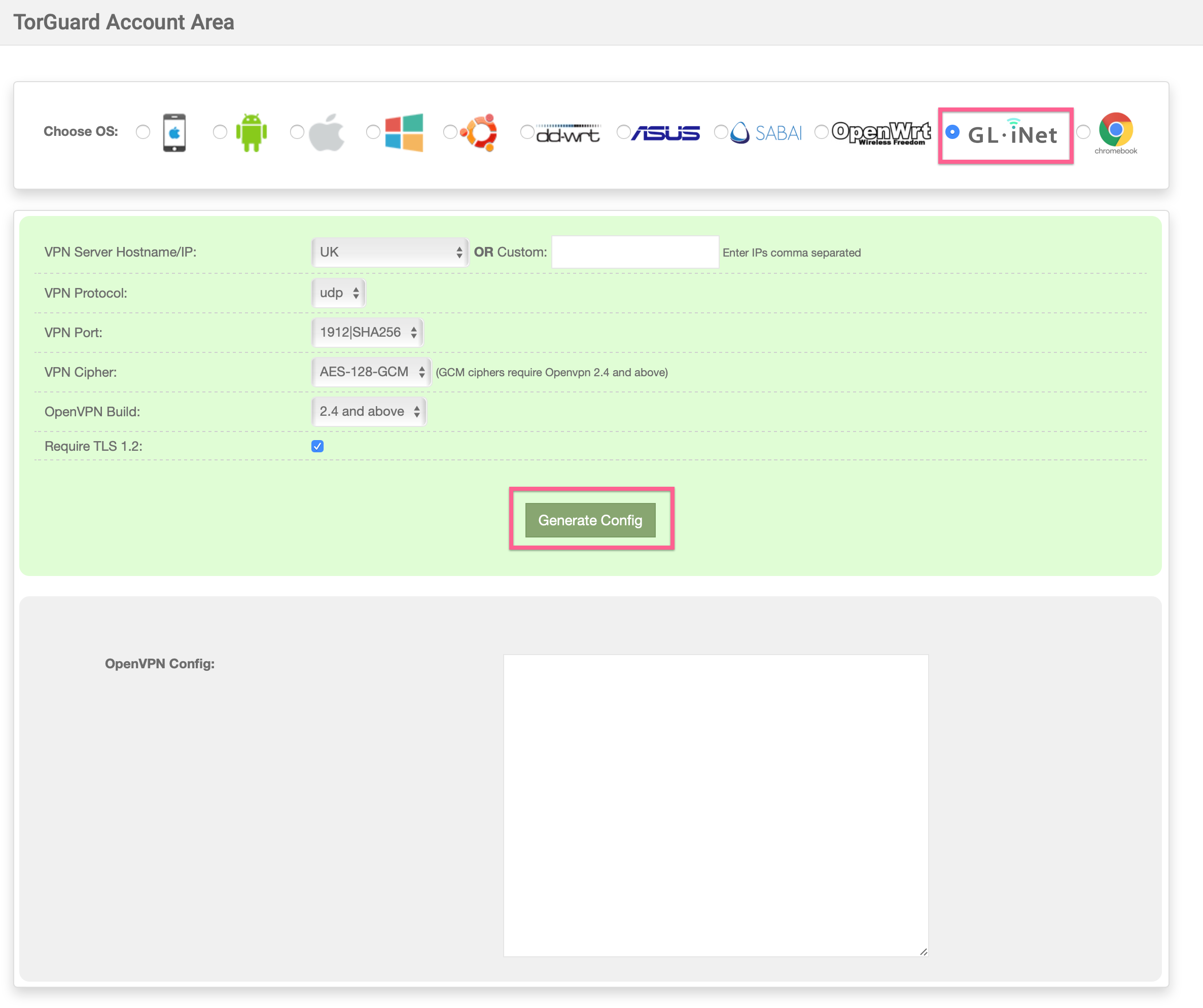
💡 Performance Tip
Use AES-128-GCM cipher instead of AES-256 for better performance on travel routers. The security difference is negligible, but the speed improvement is significant.
Import Configuration
Back in the router interface:
- Click Add New VPN Configuration
- A popup window will appear
- Drag and drop your .ovpn file or click to browse
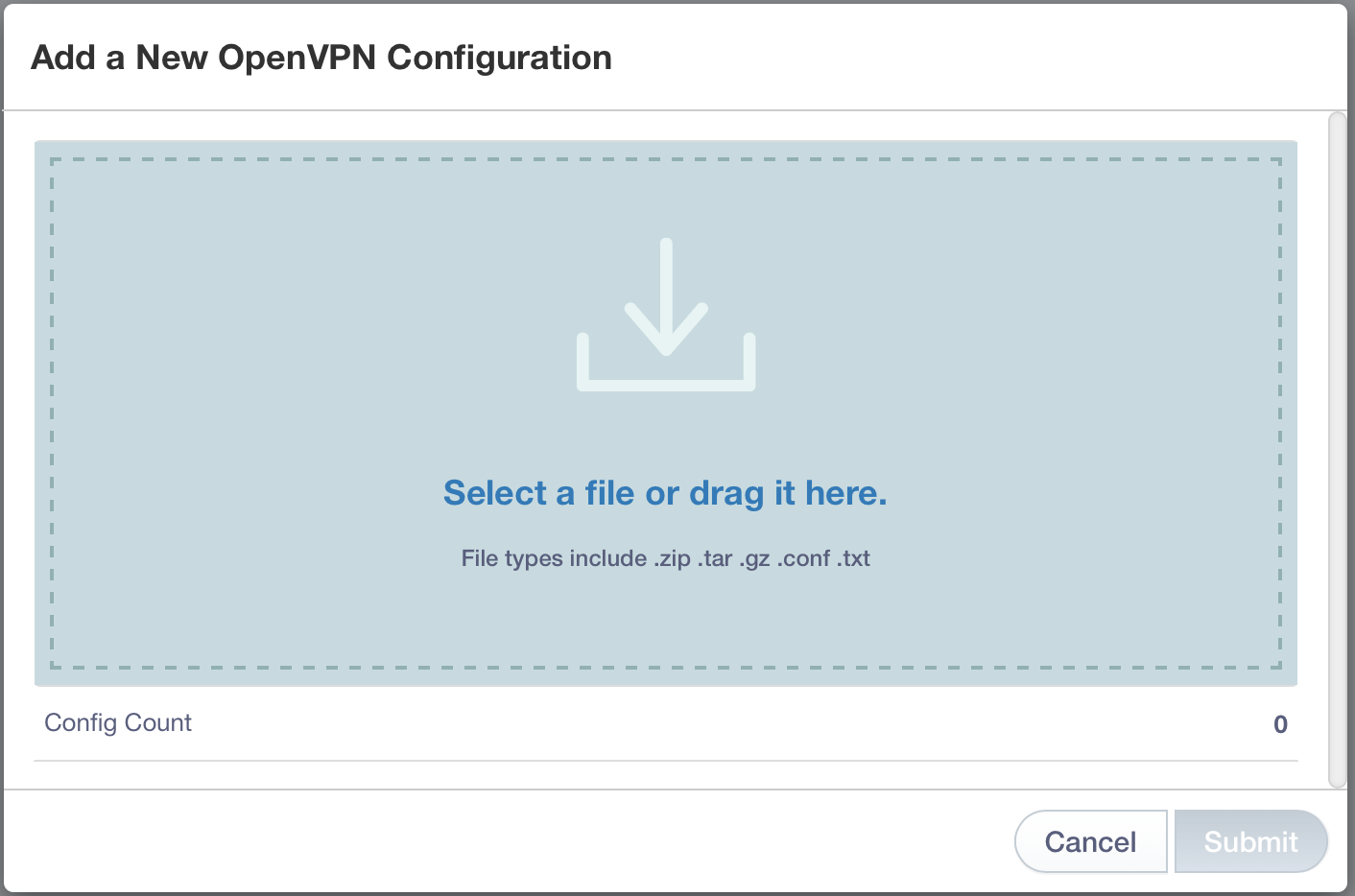
After successful import, you'll see a success message:
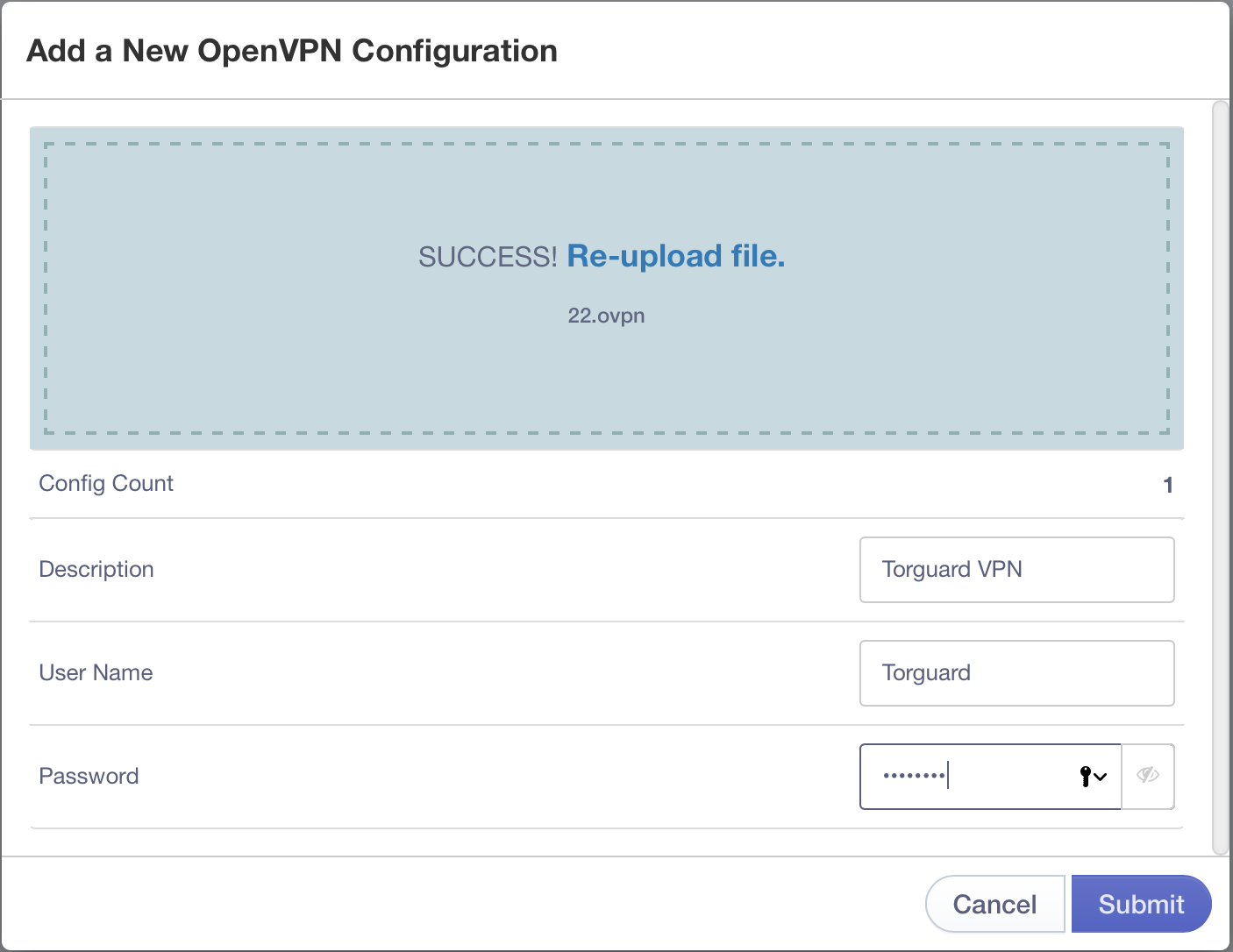
Enter your details:
- Description: Name your connection (e.g., "TorGuard USA")
- Username: Your TorGuard VPN username
- Password: Your TorGuard VPN password
Click Submit to save.
Connect to VPN
Click the Connect button. Wait 10-20 seconds for the connection to establish.
When connected successfully, you'll see:
- ✅ Connection status: Connected
- 📊 Local IP assigned by VPN
- 📈 Data sent/received statistics
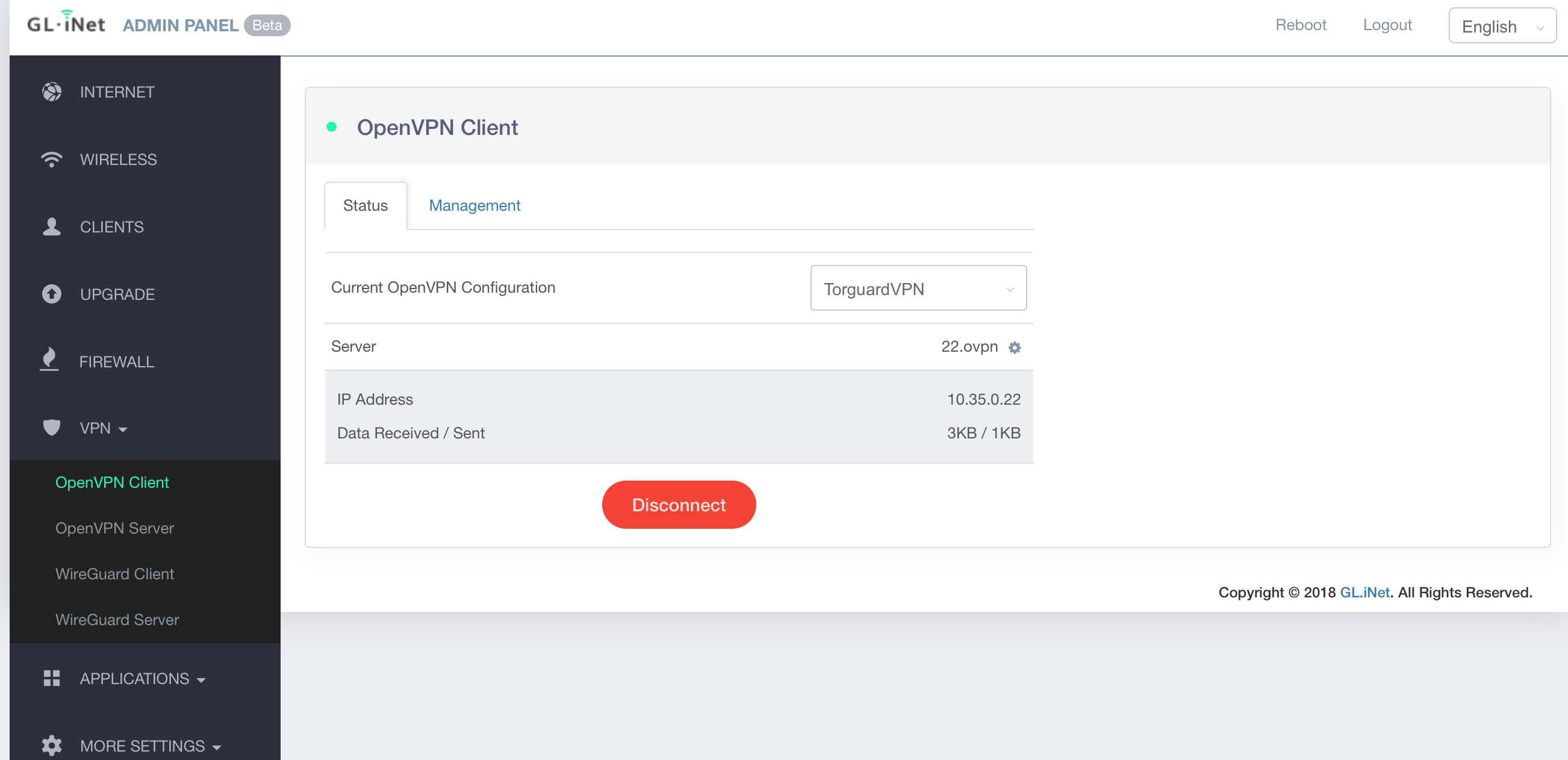
Verify Your Connection
Check your new IP address at TorGuard's IP Check
You should see the VPN server's location, not your actual location.
GL.iNet Mobile App
📱 Remote Management
Control your GL.iNet router from anywhere using the mobile app:
Features
- Remote VPN control
- Connection monitoring
- Device management
- Firmware updates
- Speed tests
Download
- iOS App Store
- Google Play Store
- Search: "GL.iNet"
Performance Optimization
🚀 Speed Tips for Travel Routers
Cipher Selection
- AES-128-GCM: Best balance of speed and security
- ChaCha20-Poly1305: Good for older/slower routers
- Avoid: AES-256-CBC (slow on travel routers)
Protocol & Port
- UDP 1194: Fastest, best for streaming
- TCP 443: Best for restrictive networks
- UDP 53: Bypasses many firewalls
Router Placement
- Keep router elevated and unobstructed
- Avoid interference from other devices
- Use 5GHz band when available
- Position between you and connected devices
Advanced Features
🔧 GL.iNet Advanced Options
Troubleshooting
🌐 Network-Specific Issues
Note 1: Some networks block VPN hostnames via DNS. Solution: Use direct IP addresses instead of hostnames when generating configs.
Note 2: Some networks filter UDP traffic. Solution: Switch to TCP protocol or try different ports like 443 or 80.
| Issue | Possible Cause | Solution |
|---|---|---|
| Can't access router interface | Wrong IP or not connected | Ensure connected to router's Wi-Fi/LAN, try both IPs |
| Config import fails | Invalid file format | Ensure .ovpn file from TorGuard generator |
| Connection timeout | Network blocking VPN | Try TCP 443, use IP instead of hostname |
| Slow speeds | Cipher too heavy | Switch to AES-128-GCM or ChaCha20 |
| Frequent disconnects | Unstable network | Enable persistent connection in settings |
| DNS not working | DNS settings conflict | Set custom DNS to 10.8.0.1 |
Travel Router Best Practices
💡 Pro Tips
- Pre-configure at home: Set up multiple server profiles before traveling
- Backup configs: Keep config files in cloud storage
- Power bank compatible: Most GL.iNet routers can run on USB power banks
- Hotel mode: Clone hotel MAC address if required for authentication
- Firmware updates: Update before trips for latest features and security
- Test everything: Verify all settings work before leaving home
Security Considerations
Need Help?
Having issues with your GL.iNet router setup? We're here to help!
Include your router model and firmware version for fastest assistance
Also check out: